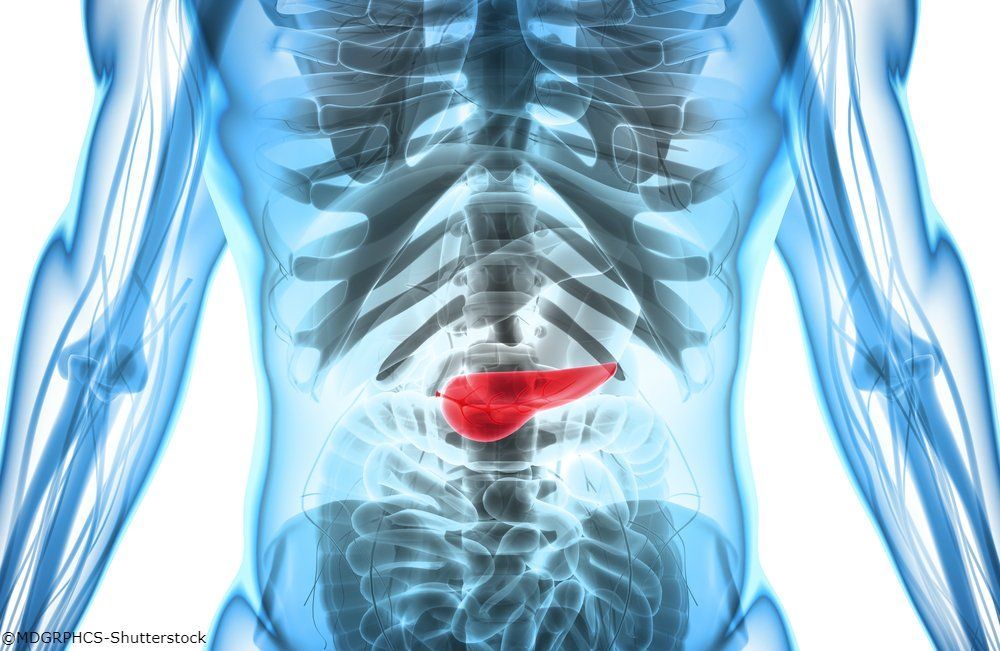Elraglusib Plus Chemo Improves OS in Metastatic PDAC With Liver Metastases
Elraglusib plus gemcitabine and nab-paclitaxel demonstrated a median OS of 12.5 months vs 8.5 months with chemotherapy alone in patients with PDAC.
Elraglusib plus gemcitabine and nab-paclitaxel demonstrated a median OS of 12.5 months vs 8.5 months with chemotherapy alone in patients with PDAC.

The GSK-3β inhibitor elraglusib (9-ING-41) plus gemcitabine and nab-paclitaxel (Abraxane) prolonged overall survival (OS) in patients with first-line metastatic pancreatic adenocarcinoma (PDAC), according to results from a prespecified subgroup analysis from part 3b of the phase 2 Actuate 1801 trial (NCT03678883) shared in a press release from the developer, Actuate Therapeutics.1
Patients treated with at least 1 full cycle of the combination therapy experienced a median OS of 12.5 months compared with 8.5 months in those who received gemcitabine and nab-paclitaxel alone, demonstrating a 43% reduction in the risk of death (HR, 0.62; 95% CI, 0.46-0.84; P = .018). The median progression-free survival (PFS) was 6.9 months vs 5.6 months, respectively.
The disease control rate (DCR) was 53.4% in the combination arm vs 44.8% in the control arm, and the overall response rate (ORR) was 37.9% vs 29.3%, respectively.
In patients with liver metastases, those who received the combination treatment experienced a 2.5-fold increase in 1-year OS, with a 38% reduction in the risk of death (HR, 0.62; 95% CI, 0.42-0.93). The median PFS was 4.9 months vs 3.9 months. The DCR was 36.8% vs 27.9%, respectively, and the ORR was 29.8% vs 19.7%.
Previously, results from this trial were shared at the 2025 American Society of Clinical Oncology (ASCO) Annual Meeting.2 In August 2023, the FDA granted orphan drug designation to elraglusib plus gemcitabine and nab-paclitaxel in the same population.3
“We are highly encouraged by the significant clinical benefit provided by elraglusib demonstrated in this study,” stated Daniel Schmitt, president and CEO of Actuate, in the press release.1 “Patients who received at least 1 cycle—or 4 weeks—of elraglusib showed a rapid and meaningful survival benefit, including a near doubling of the 1-year OS and 43% reduction in the risk of death compared with control. Separately, in the subgroup of patients with liver metastases, a population with historically poor prognosis, we observed a more than 2.5-fold improvement in 1-year OS with a 38% reduction in risk of death.”
The presentation from ASCO shared that part 3b of the trial randomly assigned 286 patients with metastatic PDAC in a 1:1:1 ratio to one of 2 combination arms or the control arm. Elraglusib was administered at 9.3 mg/kg weekly in one of the combination arms and 9.3 mg/kg twice weekly in the other. In all groups, gemcitabine was given at 1000 mg/m2 on days 1, 8, and 15 of each 28-day cycle and nab-paclitaxel was given at 125 mg/m2 on the same days. Investigators later transitioned to only administering elraglusib weekly at 2:1 randomization, because although both doses were equivalent, weekly dosing was more manageable.
Patients were 18 years or older with measurable disease per RECIST v1.1 criteria who received no prior systemic therapy for metastatic disease.
The trial’s primary end points were 1-year OS during run-in and the median OS for the full study. Secondary end points included ORR, PFS, DCR, duration of response, and time to treatment failure.
The subgroup analysis also showed that male patients (HR, 0.51; 95% CI, 0.34-0.77), patients who are White (HR, 0.60; 95% CI, 0.43-0.84), and patients younger than 65 years (HR, 0.48; 95% CI, 0.29-0.77) experienced more favorable OS results with the combination therapy.
With the elraglusib combination, the most common treatment-emergent adverse events (TEAEs) of any grade were visual impairment (67.7%), fatigue (62.6%), neutropenia (61.3%), and diarrhea (58.7%); in the control arm, they were fatigue (50.0%), diarrhea (48.7%), nausea (48.7%), and anemia (44.9%).2 The most common grade 3 or higher TEAEs with elraglusib were neutropenia (52.2%), anemia (25.2%), and fatigue (16.8%); without elraglusib, they were neutropenia (30.8%), anemia (29.5%), and thrombocytopenia (7.7%).
TEAEs led to death in 12.3% of the combination arm and 16.7% of the control arm and to stoppage of study treatment in 27.1% and 25.6%, respectively.
“These results underscore the potential of elraglusib to generate rapid and durable benefit in high-risk patients, which could be highly impactful in future development and commercial pathways,” Schmitt concluded.1
References
- Actuate Therapeutics highlights significant and sustained survival benefit in key metastatic pancreatic cancer patient populations in phase 2 elraglusib trial. News release. Actuate Therapeutics Inc. June 24, 2025. Accessed June 25, 2025. https://tinyurl.com/4z7zwmus
- Mahalingam D, Shroff R, Carneiro BA, et al. Preliminary results from the randomized phase 2 study (1801 part 3b) of elraglusib in combination with gemcitabine/nab-paclitaxel (GnP) versus GnP alone in patients (pts) with previously untreated metastatic pancreatic ductal adenocarcinoma (mPDAC). J Clin Oncol. 2025;43(suppl 16):4006. doi:10.1200/JCO.2025.43.16_suppl.4006
- Actuate Therapeutics receives FDA orphan drug designation for elraglusib for treatment of pancreatic cancer. News release. Actuate Therapeutics Inc. August 1, 2023. Accessed June 25, 2025. https://tinyurl.com/mr27s59w